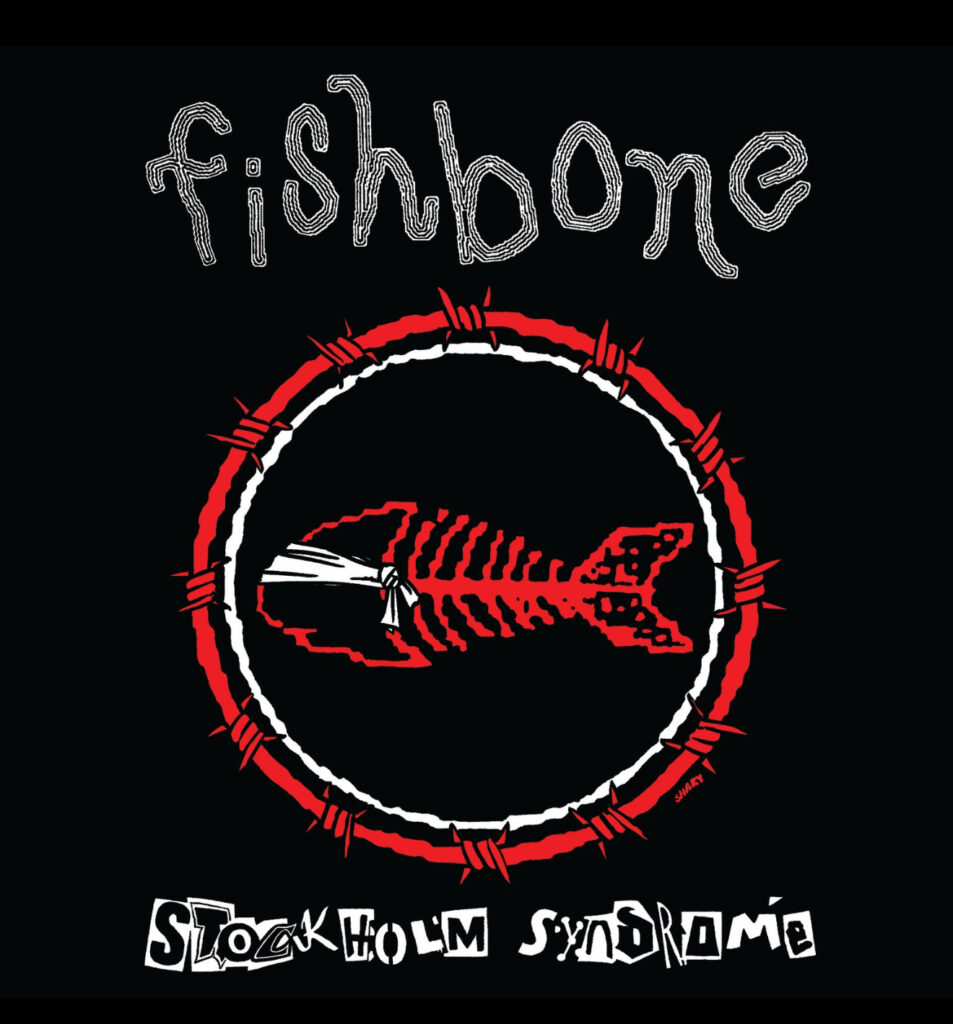
With a lineup as ever changing as the times and a discography as all over the place, the members of Fishbone are no strangers to mixing up styles. The band has gone through multiple formations over the decades since the original 1979 lineup, and now they are together with two original members along with some fresh faces (learn more about them in our Artist Spotlight). Their newest release, Stockholm Syndrome, takes the band back to their topical roots. Eclectic mixes of ska, reggae, punk, soul and even metal merge into Fishbone’s music, craftily shown in this first studio album since 2006.
The blare of horns and funky rhythm kickstart “Last Call in America,” the opening track. The music video displays a montage of American news clips along with live performances of the band. The song itself is a testament to the country, a question that asks our country’s identity and exposes the fear consuming our nation, set against a rhythmic island beat. “Last Call In America” is blatant on the violence inflicted on civilians, either in rising prices hurting families or the straight up murder at the hands of those who should’ve been protectors. Whatever your stance is, “Last Call in America” rings out as a strong topical song and warning of what we are becoming as a nation, or maybe what we have always been.
“Adolescent Regressive Behavior,” picks up the pace and spits out a fuming rap of youth and angst. This reckless juvenile story erupts in thunderous momentum to the ska styled riffs, bluesy and seething. Groovy narration holds the chaos in place, and it is a wild ride start to finish, a two-minute blues-punk throwback.
“Dog Eat Dog,” feeds into the chiming horns. Keeping in character, “Dog Eat Dog” criticizes the corporate systems that uphold and manage the music industry, often abusing its artists and getting away with it through devious contracts and legalities. Having been around for as long as they have, there’s no doubt Fishbone has had their share of this twisted industry.
Thrash rages on in “Suckered By Sabotage.” Slam metal meets reggae, often infusing with one another then switching to combat as both styles fight for advantage in this track.
In complete contrast to the heaviness of the previous track, dark ambience eases listeners into “Secret Police,” disembodied and alluring. Guided by steady drumming and deadpan vocals, there are moments of release when the full band joins together in a reckless post-punk breakdown then drifts into the droning vocals again.
“Gelato the Clown,” is played in the style of a minstrel rag-time narrative. It’s theatre, blues, swingbeat and horns colliding to tell a story, darker than the music suggests.
Let’s swing back around to the reggae rhythm. “Why Do We Keep on Dying,” questions the current state of the nation where justice is overtaken by greed and complacency. Tangy licks accompany the beat, adding flavor to the verses. Emotion soaks into this track, from the warm choral harmonies of the vocals to the ascending riffs that shred between verses.
“Hellhounds on My Trail,” is nothing short of a rockabilly ska bop. The rhythm keeps things moving forward and a swing in the beat offers the right amount of bounce so that one can easily miss the tone of the lyrics.
“Racist Piece of Shit,” is as simple as the title claims, a diss to all the Proud Boys and bootlickers. The line, “Drinking the kool aid of a mad orange king,” sums up who these muses really are. Blunt, fast, and over too soon, “Racist Piece of Shit,” slams with surf melodies, horns, and punk rock ideologies.
The jazzy and hip “All About Us,” swings and lands on the right notes. Smooth, cool-cat vocals glide above the bopping music. Clean guitar licks descend into a groovy solo, and an organ fills in the background. All the parts come together for a hefty finale, big and grandiose and keeping boots tapping.
“Love Is Love,” may be the peace anthem of Stockholm Syndrome. Doing away with the chaos of the funky riffs and trumpet blares, “Love is Love” softens up to show an idealized world where people of different walks of life can come together in harmony. The full volume of the band amps up near the end of the track, metaphoric for all the different parts that work off one another in unison. While “Love is Love” doesn’t entertain with fast hardcore riffs or a message of telling authorities off, there’s something cathartic about this piece, like a soulful hymn signing the album off.
Stockholm Syndrome’s bleak but sharp social commentary serves as the main takeaway. There’s no escaping or looking past the straightforward messages and warnings woven into these songs, and while the reggae-punk fusion is reminiscent of The Clash’s Combat Rock, it’s clear that Fishbone moves to their own beat. Structurally and lyrically, it’s a provocative, rebellious album that dares its listeners to take a critical step forward against mainstream propaganda. It would be too easy to overlook Stockholm Syndrome as an unpatriotic middle finger to authority, but frankly, it’s more than angst and bitter emotions, for it takes a strong sense of patriotism to point out your nation’s flaws, and this album stands as a musical refuge against oppression, a soulful reggae-rock album for the people. If that’s not punk rock, then I don’t know what is.
I’m Music Magazine Writer Alice Kearney

Connect with Fishbone online at:





